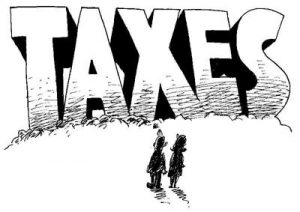States Eye E-Cigarette Taxes to Fill Budget Holes
Introducing new taxes on electronic cigarettes and e-liquid seems to be the preferred way to cover budget holes for many legislators around the US. In the first month of 2015 alone, 8 states have proposed bills to assess a tax on e-cigarettes and nicotine-containing e-liquid.
 Ever since the signing of the Tobacco Master Settlement Agreement in 1998, state governments have collected over $500 billion in taxes and compensation payments from tobacco companies. You see, the argument has always been that smoking is a serious health hazard so lawmakers should discourage the habit by raising the costs of cigarettes. Relying on this simple argument, state governments have raised tobacco excise taxes more than 120 times in the last 13 years. Everyone seemed happy with the agreement, states filled their coffers and tobacco companies still managed to make huge profits every year.
Ever since the signing of the Tobacco Master Settlement Agreement in 1998, state governments have collected over $500 billion in taxes and compensation payments from tobacco companies. You see, the argument has always been that smoking is a serious health hazard so lawmakers should discourage the habit by raising the costs of cigarettes. Relying on this simple argument, state governments have raised tobacco excise taxes more than 120 times in the last 13 years. Everyone seemed happy with the agreement, states filled their coffers and tobacco companies still managed to make huge profits every year.
But then a new, disruptive technology came along and managed to became insanely popular in just a few years. Electronic cigarettes were largely ignored by legislators in the years of their infancy, but as the number of users grew to millions, they began to take notice and devise ways of cashing in on their success. Things weren’t as simple as with cigarettes, however. E-cigs do not contain tobacco, nor the tar, carbon monoxide or the countless carcinogens found in cigarette smoke, so using the health argument didn’t seem like a viable option.
That doesn’t meant they didn’t use it anyway. Relying on a well-planned scaremongering campaign carried out every single day by corporate media, as well as controversial studies, officials often invoked concerns regarding the potential negative effects of vaping on public health, constantly asking for more evidence that electronic cigarettes are indeed a less hazardous alternative to smoking. It didn’t matter that some of the brightest minds in the field of medical research spoke on behalf of these revolutionary devices, praising both their role in helping smokers quit and their effects on the health of former smokers, nor that virtually every reliable scientific study that came out confirmed their findings. They just kept asking for new evidence.
Acting as protectors of public health and impressionable youth who, attracted by e-cigarette flavors, would later become smokers – a theory already debunked by several studies – state officials set out to fight these dangerous devices. And what better way to do that than introducing new taxes or regulating them as tobacco products and assessing existing taxes.
Last year, 12 state legislatures considered bills that would have assessed taxes on electronic cigarettes and nicotine-containing e-liquid. North Carolina was the only state where the bill actually passed, introducing a a new tax equal to five cents per milliliter of nicotine e-liquid. In the 11 other states, vapers stood up for themselves, organizing protests and movements that eventually killed the tax hikes.
Legislators don’t seem to discouraged by the outcomes of last year’s battles, since 8 other states have proposed bills for e-cigarette taxes in January 2015 alone. Arkansas, Nevada, Indiana, New Mexico, New York, Oregon, Virginia and Washington have all proposed tax bills that range from 30% to 95% of their sales price. And since many state legislative sessions only begin this month, plus four states that start their sessions in the next month or two, the list of e-cigarette tax bills will most likely keep growing.
Also, this month, California senator Mark Leno, proposed Senate bill 140, which would reclassify electronic cigarettes as tobacco products, even though they do not contain tobacco, and assess taxes applicable to them. “We’re going to see hundreds of thousands of family members and friends die from e-cigarettes use just like we did from traditional tobacco use,” Leno threatened in support of his legislative initiative. His words will probably convince many uneducated people that he holds their best interests in mind, even though there is no scientific evidence to sustain them. Perhaps Mr. Leno would like to tell us how many of the millions of vapers worldwide have died or reported serious health problems as a result of using e-cigarettes properly?
Unfortunately, taxes on electronic cigarettes seem inevitable, but they may very likely have some serious unintended consequences. Apart from the fact that for many smokers, even a small increase in the price of e-cigs and e-liquid might discourage them from making the switch, it could also cause current users to turn to black markets for cheaper products of questionable quality.
Considering legislators are actively trying to raise the costs of products that stand to improve smokers’ health, one has to wonder what they are most interested in – supporting public health or maintaining their monopoly on tobacco cigarettes and covering budget holes?
















